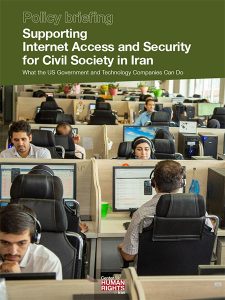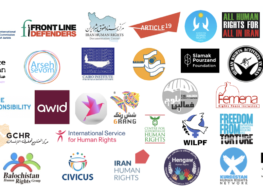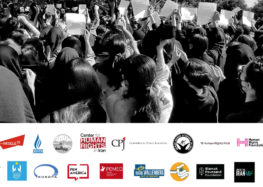New Report: Lack of Access to Tech Products Blocks Internet Freedom in Iran
 Biden Administration, Companies Can Support Digital Rights without Lifting Any Sanctions
Biden Administration, Companies Can Support Digital Rights without Lifting Any Sanctions
April 26, 2021—A new policy briefing released today by the Center for Human Rights in Iran (CHRI) details the difficulties Iranians have purchasing or using international technology products due to U.S. sanctions, and their increased vulnerability to the Iranian government’s online surveillance and censorship as a result.
Without access to international communications tools and services, Iranians must use Iranian-produced products that provide the government backdoor access into online accounts, allowing the authorities to block content and eavesdrop at will.
The 18-page briefing, Supporting Internet Access and Security for Civil Society in Iran, provides specific recommendations for both the Biden administration and technology companies on actions they can take—without lifting any sanctions—that would provide much-needed support for safe online communication in Iran.
“Without access to international tech products that safeguard privacy, Iranians’ online communications are exposed to a government that will imprison people for online content it doesn’t like,” said CHRI Executive Director Hadi Ghaemi.
“The Biden administration can support internet freedom in Iran without lifting any sanctions, by simply implementing sanctions policy more effectively,” Ghaemi added.
General License D1 Needs to Be Clarified and Updated, Companies Encouraged to Sell Products
While U.S. sanctions prohibit companies from doing business with Iran, the U.S. Treasury’s Office of Foreign Assets Control (OFAC), under General License D1, permits the sale of “personal communications tools and services” to Iranians, in recognition of the vital role these items play in supporting freedom of expression in repressive countries.
Yet despite D1, companies remain reluctant to sell their products to Iranians or to allow Iranians access to their free services. This is due to concerns over sanctions violations that arise from the lack of specificity and inclusiveness in the D1 license.
As a result, Iranians rely on communication products produced in Iran that strengthen the government’s ability to block and censor content and allow easy state access into accounts for surveillance. This poses serious security risks for users, who operate in a context where online content can land one in prison. The effect has been particularly harmful for the activist and dissident communities.
CHRI’s briefing examines how D1 needs to be clarified and updated to reflect current technologies, and how the Biden administration can address the “climate of fear” surrounding sanctions by providing assurances to companies regarding the permissibility of sales.
It also recommends a streamlined OFAC application process for licenses to sell products not covered under D1, and OFAC-designated financial channels for Iranians so they can pay for the products.
Companies, meanwhile, according to the briefing, should pursue sales of communication tools and services to Iranians, as part of their commitment to uphold freedom of expression and digital rights.






